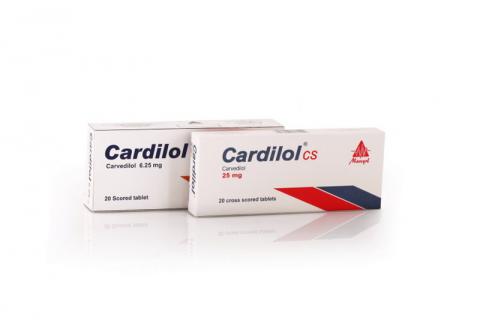Brand Name: Cardilol Tablet
Active Ingredient: Carvedilol 25mg Tablet
Carvedilol 6.25mg Tablet
When is Cardilol Tablet prescribed for?
Cardilol Tablet is prescribed for the treatment of essential ( non –organically determined) hypertension, chronic stable angina pectoris and chronic heart failure.
How should you take Cardilol Tablet?
- Increasing to 25 mg once daily thereafter this may be increased to 50 mg/day if necessary after 2
weeks. - In patients with controlled CHF the daily dosage of Cardilol should be titrated upward gradually from 3.125 mg twice daily over an interval of at least 2 weeks.
- The dosage should be increased to the maximum tolerated dosage up to a maintenance dosage of 25 mg twice daily.
- In the treatment of Angina pectoris, the recommended dose for initiation of therapy is 12.5 mg twice a day for the first 2 days thereafter.
- The recommended dosage is 25 mg twice a day if necessary the dosage may subsequently be increased at interval of at least 2 weeks.
When Cardilol Tablet must not be prescribed?
- Simultaneous administration of MAO inhibitors (Except: MAO-B inhibitor).
- Bronchial asthma, Chronic Bronchitis and pulmonary emphysema.
- Second or third degree AV block, sinus node syndrome, sinoatrial block.
- Cardiogenic shock or severe bradycardia.
- Clinically manifested hepatic impairment.
- In patients hypersensitive to the active ingredient carvedilol or to other ingredients of the product.
- Patients under 18 years old.
- Impaired renal function/serum creatinine concentration > 1.8 mg/dl or creatinine clearance < 30 ml/min.
- Metabolic acidosis.
Other drugs that interact with Cardilol Tablet:
- Catecholamine-depleting agent: e.g. Reserpine and MAO inhibitors when taken with Cardilol should be observed closely for signs of hypotension and/or severe bradycardia.
- Clonidine: when given with Cardilol, may potentiate blood pressure and heart rate lowering effects.
- When given concomitantly and Clonidine is to be terminated Cardilol should be discontinued first.
- Clonidine therapy can then be discontinued several days later by gradually lowering the dose.
- Digoxin: digoxin concentration is increased by 15% when given concomitantly and both slow AV conduction. Therefore. Increased monitoring of digoxin is recommended when initialling. Adjusting, discontinuing Cardilol.
- Calcium channel Blockers: As with other B-Blockers, Cardilol when co-administered with Verapamil or Diltiazem type.
- It is recommended that ECG and blood pressure be monitored.
- Insulin or oral hypoglycemics: as with other B-Blockers, Cardilol may enhance blood-sugar-reducing effect when given concomitantly so blood sugar regular monitoring is required with anaesthetics.
- If Cardilol treatment is to be continued perioperatively, particular care should be taken when anaesthetic agents which depresses myocardial function, such as ether.
- Cyclopropane and trichloroethylene are to be used.
Possible Side effects with Cardilol Tablet:
- Occasionally dizziness, headache and tiredness may occur. Gastrointestinal upset (nausea, vomiting, abdominal pain, constipation).
- Postural hypotension, Fluid overload, on rare occasion, there may be angina pectoris or disturbances of conduction from the atrium to the ventricle of the heart.
- There have been reports of isolated cases of allergic reactions.
- Upper respiratory tract infection.
- Urinary tract infection.
- Increased sweating.
- Body as a whole: Fatigue. Chest pain, Oedema, Fever.
- Cardiovascular: Bradycardia, Hypotension, Syncope, AV-block
Some Warnings and Precautions about Cardilol Tablet
- Mild and reversible hepatocellular injury has occurred rarely. If the patient has laboratory evidence of liver injury or jaundice, Cardilol should be stopped and not restarted.
- Peripheral vascular disease: B-Blockers can precipitate or aggravate symptoms of arterial insufficiency in patients with peripheral vascular disease. Caution should be exercised in such individuals.

